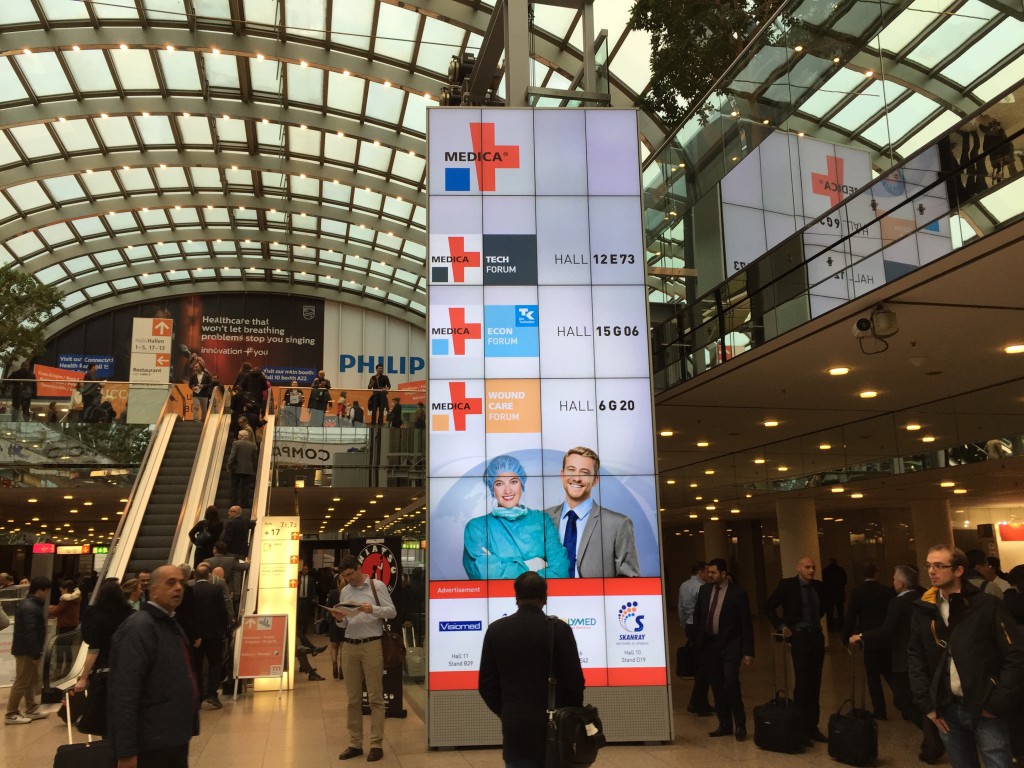~まず、はじめに~
前回のコラムでは、IT技術を用いたウェアラブル製品を中心にお伝えしましたが、今回はTelemedicine(遠隔治療)やその他ユニークな健康管理サービスの動向についてお伝えします。また、ドイツがなぜこのようにユニークな製品やサービスを数多く生み出すことが出来るのか、その仕組みについてもご紹介させて頂きます。どうぞお楽しみください。
~ドイツにおけるTelemedicine(遠隔治療)の動向~
近年日本においてもTelemedicine(遠隔治療)という言葉を耳にすることが増えてきましたが、ドイツにおいても非常に注目されていました。専用のブースが設けられ、数多くのTelemedicine企業が出展していました。
Telemedicineと聞くと、病院に行かなくても医師の診察を遠隔で受診できる魅力的な治療とイメージを持たれるかと思います。また前回のコラムでもご紹介させて頂きました「タイト」のように、Telemedicineをサポートする様々な医療機器も開発されています。
一方ビジネスとしてはまだまだ創生期で、様々なビジネスモデルが存在しています。ドイツのあるTelemedicine企業は、20名の医師と契約して250名の患者さんにサービスを提供しています。企業は患者さんにサービス料を請求し、その料金は20分50ユーロ(およそ6,000円)とのことです。
ドイツの別のTelemedicine企業にも話を聞きました。その企業は患者さんではなく、医師に対してサービス料を請求するようです。料金は、医師1人あたり月額80ユーロ(およそ10,000円)とのことです。他の病院との差別化を図るためにTelemedicineを導入する病院が増えており、その企業は医師及び患者さんが使いやすいポータルを提供することで医師から対価を得ています。
どちらのビジネスモデルか、またそれ以外のモデルが主流になるかという視点からも、今後のTelemedicineの動向に注目です。
~ゲームを活用した健康管理サービス~
医療とは一見関係のなさそうな企業も出展していました。その一つがゲーム制作会社です。ゲームの力で健康管理を促そうという発想のもと、ドイツのシリアスゲームズソリューションという企業は、開発したゲームを大手製薬会社に提供しています。製薬会社は、例えば糖尿病患者さんの運動管理のサポートツールとしてゲームを活用しています。同じくドイツのセラバイツという企業は認知機能回復を図るゲームを開発しており、こちらは保険会社を主要顧客としてゲームを提供する計画のようです。
ゲーム制作会社までもが積極的に医療サービスを開発しており、改めて医療業界の魅力、懐の深さを感じました。
~医療産業を支えるドイツの仕組み~
なぜドイツはこのようにユニークな製品やサービスを数多く生み出すことが出来るのでしょうか?その背景には「クラスター制度」という仕組みがあります。ドイツは16の州から成り立っていますが、主にそれぞれの州が運営主体となり、中小規模の医療機器や医療関連サービス企業をサポートする「クラスター」と呼ばれる組織が複数存在しています。
我々は今回ドイツ南部にある2つのクラスターと面談をして、関係を構築してきました。それぞれのクラスターには、なんと500を超える企業がメンバーとして加盟しているそうです。クラスターによる具体的なサポートは、製品開発段階の企業に対しては共同研究を行うパートナー企業を紹介したり、海外市場へのビジネス展開を検討している企業に対しては承認手続きやマーケティング等、幅広いサポートを提供しているようです。
我々は今後ドイツのクラスターとの繋がりを生かして、ドイツの素晴らしい医療機器やサービスを日本に紹介していきたいと考えています。
~次号について~
第二回および今回のコラムでは、MEDICAに出展されていた数多くの製品、サービスの中から、特に印象的なものをご紹介させて頂きました。
最終回となる次号では、視点を変えてドイツの医療制度について考えてみたいと思います。また我々はドイツのある病院を実際に訪問してきましたので、その内容も併せてお届けします。(文責:杉本)

